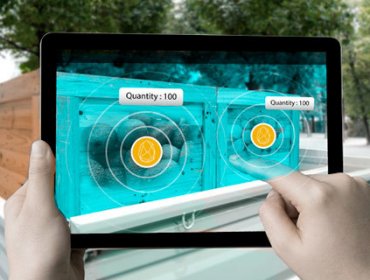Unicsoft’s senior project manager, Dmytro Grebennikov, was invited to participate in the ICONET project as a member of its advisory board. ICONET is a far-reaching EU project funded by the EU Horizon 2020 programme, which lasted for 30 months and is supported by big-name partners featuring IBM, P&G, Sonae and others.
The project focuses on state-of-the-art research and development associated with the new architecture of the Physical Internet (PI) concept for interconnected logistics hubs. The primary goal is to utilize the Physical Internet and other leading-edge technologies, including Blockchain ledger, to revolutionize transport and logistics across Europe.
Dmytro shared his blockchain and supply chain expertise to guide the team and enhance their competence. At the same time, Unicsoft’s participation in the project gave our specialists a deeper understanding of the architecture and benefits of the PI.
Here’s our project manager’s experience with being part of ICONET, along with some examples of supply chain projects we’ve completed that show the potential of this sector.
Role of ICONET’s Advisory Board in the EU-wide Implementation of PI
When Dmytro was invited into the ICONET project, the main task of its advisory board was to guide and support the project research teams in developing ideas, crafting solutions, and envisioning real-world implementations of the PI. Through the years of its operation, the advisory board members engaged with numerous challenges connected with PI implementation in the supply chain sphere. They discovered that the most challenging tasks aren’t associated with the essence of the emerging technology. Instead, the most complex issues arise in the implementation stage.
The practical aspects of the supply chain business impose many restrictions and obstacles on implementation. Individual companies might not be ready to incorporate new, high-end, technologies into their workflow, since doing so may require extensive adjustment of internal processes, personnel training, costly equipment, and so on. Moreover, certain industry players, usually the large ones, often have unique equipment or packaging that may be inconsistent with the advanced supply chain system.
When it comes to moving PI from concept to action, issues surface, and require creative, effective resolution. The vital task of the advisory board members is to anticipate obstacles and provide expert guidance in advance. For this reason, the ICONET project has engaged only members with extensive successful tech implementation experience for its advisory board. Specialists like Unicsoft’s supply chain expert contribute insights based on their practical experience to guide and support the research team as it develops ideas, solutions and focuses on real-world implementation.
What is the Goal of the ICONET Project?
Coordinated by Inlecom, the project involved 16 partners that researched and implemented the Physical Internet to transform the way freight is moved, stored, supplied, and used. The key objectives of the project include:
- Exploration of new business opportunities within the PI for intermodal transport, e-commerce, and warehousing..
- Development of options for simulating and testing PI concepts (including PoC, experimental infrastructure platforms, and more).
- Development of representative PI solutions for each of three focus areas based on inputs received from the Living Labs.
In the traditional logistics model, each firm uses its own supply chain network or provider. This is an inefficient and fragmented system that leads to wasted resources and manpower. With the Physical Internet solution, stakeholders can optimize cargo flows against throughput, cost, and environmental performance. PI solutions are based on governance policies and service level agreements, and parties in the supply chain are continuously and fully aware of network operations and their status.
The ICONET project team successfully designed and built a demonstrable Proof of Concept of PI networking technologies and infrastructure. The ICONET PoC was deployed, tested, refined, and extended in four industry-driven PI Living Labs, with each lab focused on one of the four key PI capabilities.
The ICONET project concluded in February 2021 with many positive outcomes that addressed the industry’s current fragmentation and environmental impact, and helped identify the constraints and challenges of implementing PI.
While the reality of a unique, standardized logistical unit such as the PI container still seems some way off, projects such as ICONET show how to make it possible one day.
Unicsoft’s Relevant Supply Chain Expertise
The ICONET project focused on researching and implementing the Physical Internet, which tied in perfectly with Unicsoft’s successful experience in innovative technologies, namely the adoption of blockchain in the supply chain. Blockchain technology enhances security and trust, boosts efficiency, and assists with real-time tracking, increasing process transparency. Here are some examples of supply chain projects that Unicsoft has worked on.
Blockchain-Based Track and Trace System
Grey imports and counterfeiting are a worrying market trend. Our client’s aim was to create a solution to document all supply chain updates to a single shared ledger, thereby guaranteeing complete data visibility, immutability, and transparency for all supply chain participants.
We developed a semi-decentralized solution for issuing and tracking encrypted blockchain-based data matrix codes as the main layer of protection against grey market imports. The result was an app that allows manufacturers to check the authenticity of goods and report counterfeits using highly secure data storage and encryption.
Case study: BLOCKCHAIN-BASED TRACK AND TRACE SYSTEMException Prediction Tool for Supply Chain
Our client—a leading provider of supply chain consulting, software, and fourth-party logistics services—wanted to optimize logistics execution using machine learning for automated prediction and data processing from different suppliers.
Our team of experts collaborated with the client’s R&D department to extensively rework their machine learning model for logistics incident prediction and supplier-related incidents. The new ML model provided an 80% increase in the precision of forecasts, an easy-to-use and modern interface, and the ability to generate reports in different formats.
Case study: EXCEPTION PREDICTION TOOL FOR SUPPLY CHAINSupply Chain Transparency for the Gold Mining Industry
Financial institutions must trace the origin of every gold bar they give out, but there is no secure or convenient way to track whether gold has come from a certified mine or refinery. Our experts developed and proposed the idea of applying a QR code to each gold ingot in the supply chain.
The result was a customized system for registering operations and detecting blockages. Currently at the MVP stage, the system resolves issues associated with regulating the gold market, and automates all exchanges between suppliers and gold recipients.
Case study: SUPPLY CHAIN TRANSPARENCY FOR THE GOLD MINING INDUSTRYAre you planning to develop an innovative blockchain-based solution for supply chain or logistics? Is your company looking to leverage emerging technologies to improve its business outcomes? Unicsoft’s experts can help. Contact us today and let us help you create the custom solution to your challenges.







